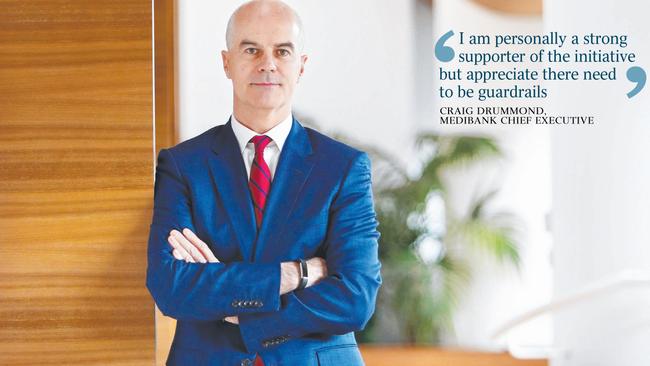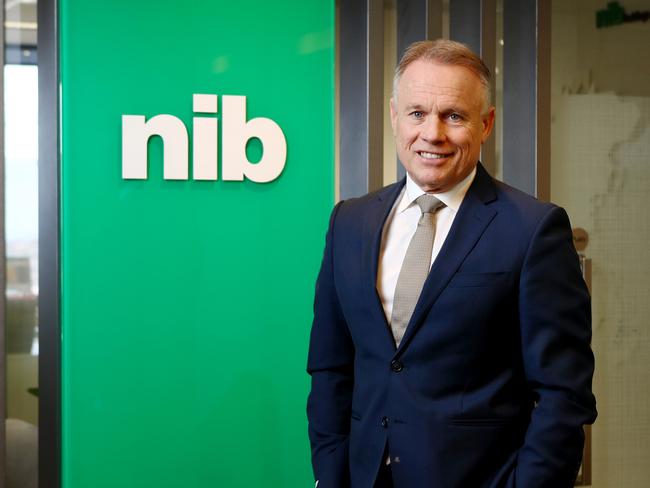My Health data revolution ‘can save lives’
Australia’s private health heads say the federal government lost the narrative on the rollout of My Health Record.
The heads of Australia’s private health industry have argued that the federal government has lost the narrative on the rollout of My Health Record as they backed the initiative and called for greater use of data to fuel preventive care.
Mark Fitzgibbon, head of health insurer NIB, also rejected suggestions insurers could be accessing data from the digital health record system.
“Forget the idea insurers can use somebody’s individual health profile to disadvantage them — in our world of community rating, enshrined in the legislation and our culture, we charge people the same price irrespective of age and health status,” he said.
The rollout of the e-health initiative lost momentum as privacy concerns dominated headlines, forcing Health Minister Greg Hunt to commit to change the laws protecting consumers and their data. A Senate inquiry is also set to examine the security measures around the e-health records, which Australians have until October 15 to opt out of.
Medibank chief executive Craig Drummond was confident the government would work through the issues, adding that the insurer supported the digital record.
“I am also personally a strong supporter of the initiative but appreciate there needs to be guardrails and I respect the views of those who have concerns around cyber risks because they are alive in any business,” he said.

Defence Health chief executive Gerard Fogarty said the implementation of My Health Record was poor, arguing the government lost control of the message.
Mr Fogarty said his members had been “screaming” for a digital health record for years, given most of them had to move, and change GPs, every two years.
But he said it was a different conversation with members about the insurer accessing the data, which he said went to an issue of trust.
“The industry has a long way to build that trust with its membership before they are going to give access to that health record to a private health insurer,” Mr Fogarty said.
“But I think the future is private health insurers having a far more active engagement with their members around not just what happens in tertiary care settings but what is also happening in primary care settings.”
Gordon Ballantyne, head of private hospital group Healthscope, argued that the pitch for the initiative should have been to look at practical examples of why it was important as opposed to the macro examples of why it should be slowed.
He said he supported the My Health Record but added that was notwithstanding the privacy issues. “If you look at the presentations in emergency departments, 25 per cent of subsequent fatalities were a result of having no access to a clinical medical record,” he said.
“There are real practical benefits to medical records being provided and having transparency and interoperability across different healthcare settings.”
Ramsay Health Care chief executive Craig McNally the benefits were theoretically significant in terms of reducing duplication and reducing error.
“The benefits are clear but whether they can be delivered is the real question and there are lots of issues around that,” he said.

NIB’s Mr Fitzgibbon said it was important to broaden the message about the e-health records to explain to consumers that having the health data in a safe and secure place and analysing it to write population health algorithms could improve society.
“The rise of data science is enabling what we couldn’t dream of five years ago,” he said.
“There is the ability to write algorithms from millions of health records that enable a consumer to predict, based on their health profile, what health risks they have and what they should be doing to manage or avoid that risk.”
Mr Fitzgibbon said the debate about the use of My Health Records put the focus on the wider conversation about the use of data and technology to improve health outcomes.
He said the insurer was going through a procurement process to obtain technology that would allow NIB to generate insights into individuals, such as biology, psychology and genealogy.
“We need this information to start to localise algorithms at a population level, so we can write equations that help us to better guide your health decisions and better guide your treatment decisions,” he said.
“This technology exists and is growing. We don’t want to reinvent the wheel and we are talking to large global companies to procure their IP in IT under different partnership arrangements to bring this technology to Australia.”



To join the conversation, please log in. Don't have an account? Register
Join the conversation, you are commenting as Logout